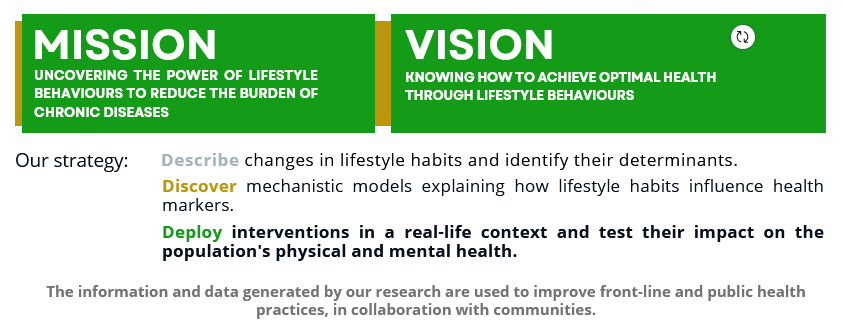Who we are
The Investigations on mechanisms and predictors of links between physical activities, other behaviors and health trajectories laboratory is co-directed by Professor Mathieu Bélanger and Professor Saïd Mekari at the Centre de formation médicale du Nouveau-Brunswick.
Many of the risk factors for chronic diseases, both physical and mental, can be modified through lifestyle changes. Nevertheless, making lifestyle changes at a population level remains a challenge.
Over the years, researchers and students from IMPACTS Lab have successfully demonstrated their ability to develop and implement effective and sustainable interventions to improve the lifestyle habits of various target groups.

Rigor
- The laboratory uses the most appropriate methodologies to attain its objectives. The use of complex statistical analyses is one strength of the laboratory.
- The laboratory aims for complete investigation of research objectives. Often, audacity, perseverance and creativity are used to attain these objectives.
- Laboratory members commit to completing work of which they are proud. They respect research protocols and act with integrity and honesty.
Communication
- The laboratory communicates its findings in a clear and effective way by using reputable academic means.
- The laboratory strives for knowledge transfer. Using adequate strategies, knowledge is shared to the knowledge users.
- The laboratory commits to relevant and useful research for stakeholders and the population. Opportunities that allow engagement from these groups is maximized since it influences the research agenda.
- Laboratory members demonstrate openness, are attentive and compassionate. To maintain harmony, oppositions to personal beliefs are discussed before problems arise.
- The laboratory compliments its strengths by maintaining productive collaborations with external researchers and stakeholders to achieve excellence.
Development
- The laboratory employs an effective solutions model that favours the use of proven solutions instead of re-inventing the wheel. If no solution exists, the laboratory creates new ones.
- Laboratory members have an open mind and appreciate innovation.
- The laboratory continually develops research capacity by offering additional training, by ensuring the development of future generations of researchers and by participating in setting up research infrastructure.
- The laboratory values the implication of students and trainees.
- The laboratory is committed to the continued development of its members and supports their professional fulfilment.
